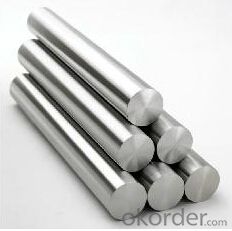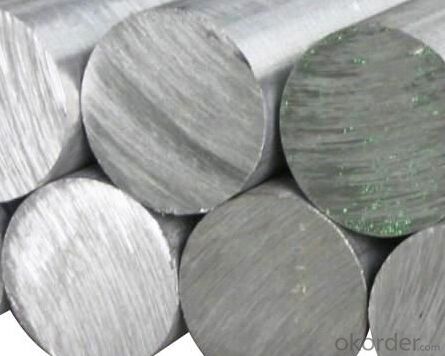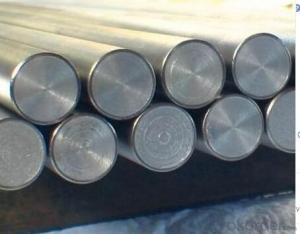ISO9001 Certificate Precision Compression Spring
- Loading Port:
- Tianjin
- Payment Terms:
- TT or LC
- Min Order Qty:
- 1000 m.t.
- Supply Capability:
- 50000 m.t./month
OKorder Service Pledge
OKorder Financial Service
You Might Also Like
Product Description:
OKorder is offering ISO9001 Certificate Precision Compression Spring at great prices with worldwide shipping. Our supplier is a world-class manufacturer of steel, with our products utilized the world over. OKorder annually supplies products to European, North American and Asian markets. We provide quotations within 24 hours of receiving an inquiry and guarantee competitive prices.
Product Applications:
ISO9001 Certificate Precision Compression Spring are ideal for structural applications and are widely used in the construction of buildings and bridges, and the manufacturing, petrochemical, and transportation industries.
Product Advantages:
OKorder's ISO9001 Certificate Precision Compression Spring are durable, strong, and resist corrosion.
Main Product Features:
· Premium quality
· Prompt delivery & seaworthy packing (30 days after receiving deposit)
· Corrosion resistance
· Can be recycled and reused
· Mill test certification
· Professional Service
· Competitive pricing
Product Specifications:
Specifications of ISO9001 Certificate Precision Compression Spring:
ISO9001 certificate
Wire diameter: 0.15mm to 7.0mm
Material: stainless steel, swc,swp
Engine valve spring
We have the CNC computer spring machine, non-cam and non-rocker, independent control by multiple servo motor, which can produce the biggest diameter spring. Fast production, precision positioning, steady operation. | |
Wire diameter: | 0.08mm-10mm. Size and style are made by drawings. |
Materials: | adopt the domestic and imported swc, sus, swp, mild steel wire, manganese steel wire, phosphorus copper wire, nickel-plated wire, zinc-plated wire, tin-plated copper wire, nickel-plated steel wire, non-magnetic stainless steel wire, heat-resistant steel wire, duplex stainless steel wire(corrosion resistant and heat resistant steel wire), bronze, copper, phosphorus copper, beryllium copper. Alloy steel has 60Si2MNA, 60Si2CRVA, 55CrSi. |
Surface treatment: | plate gold, silver, white, red yellow, blue, green, purple, black, etc., salt spray test more than 100 H. Appearance beautiful and bright. |
Application: | electronics, electrical appliances, toys, locks, stationery, furniture, washing machines, vacuum cleaners, lamps and lanterns, stroller, bicycle, gift, handicraft, gifts, cameras, printers, office equipment, precision equipment, all kinds of transportation, car accessories, sports equipment, switches, sockets, water heater, calculator, watches, ignition, mouse, motor, mobile phone, mementoes, fan, video DVD, etc |
Usage/Applications
We import the most sophisticated computer compression spring machine from Taiwan; it can do 100 percent inspection to spring length, which ensured the spring quality stable and precise
Widely used in automobiles, motorcycles, electrical appliances, telecommunication, communication, aviation, space and other civil fields
Packaging & Delivery
Inner packing: plastic or PE bags
Outer packing: corrugated cartons, wooden boxes or pallets
Testing equipment
We have a andvanced testing equipment to gueranteen the good quanlity of our products.
FAQ:
Q1: Why buy Materials & Equipment from OKorder.com?
A1: All products offered byOKorder.com are carefully selected from China's most reliable manufacturing enterprises. Through its ISO certifications, OKorder.com adheres to the highest standards and a commitment to supply chain safety and customer satisfaction.
Q2: How do we guarantee the quality of our products?
A2: We have established an advanced quality management system which conducts strict quality tests at every step, from raw materials to the final product. At the same time, we provide extensive follow-up service assurances as required.
Q3: How soon can we receive the product after purchase?
A3: Within three days of placing an order, we will begin production. The specific shipping date is dependent upon international and government factors, but is typically 7 to 10 workdays.


- Q:What are the different cutting tools used for special steel?
- There are several different cutting tools that are commonly used for special steel applications. These tools are specifically designed to handle the unique properties and characteristics of special steel, which often requires more precise and specialized cutting techniques. Some of the most commonly used cutting tools for special steel include: 1. Carbide tipped saw blades: These saw blades have carbide teeth, which are extremely hard and durable. They can cut through special steel with ease, providing clean and accurate cuts. 2. High-speed steel (HSS) cutting tools: HSS cutting tools are made from a type of tool steel that can withstand high temperatures and maintain their hardness. These tools are commonly used for drilling, milling, and turning operations on special steel. 3. Diamond cutting tools: Diamond is one of the hardest materials known to man, making it ideal for cutting through tough materials like special steel. Diamond cutting tools, such as diamond-coated saw blades or grinding wheels, are commonly used in special steel applications. 4. Waterjet cutting machines: Waterjet cutting machines use a high-pressure stream of water mixed with abrasive particles to cut through special steel. This method is particularly suitable for complex shapes and intricate designs. 5. Plasma cutting machines: Plasma cutting machines use a high-velocity jet of ionized gas to cut through special steel. This method is often used for cutting thick sections of special steel quickly and efficiently. 6. Laser cutting machines: Laser cutting machines use a highly focused laser beam to cut through special steel. This method offers high precision and can be used to cut complex shapes and patterns. It is important to choose the appropriate cutting tool based on the specific requirements of the special steel being worked with, as well as the desired cutting method and application. Consulting with a specialist or referring to the manufacturer's recommendations can help ensure the best cutting tool is selected for the job.
- Q:Can special steel be used for electrical applications?
- Yes, special steel can be used for electrical applications. Special steel has excellent electrical conductivity and can be used in various electrical components and equipment like power transformers, generators, electrical motors, and electrical transmission systems.
- Q:What are the challenges in surface treating special steel?
- Surface treating special steel can present a range of challenges due to the unique properties and composition of the material. Some of the main challenges include: 1. Hardness: Special steels often have a high level of hardness, making it difficult to achieve effective surface treatment. Traditional methods like heat treatment or chemical processes may not be sufficient to alter the surface properties without affecting the core strength. 2. Surface contamination: Special steels are susceptible to contamination during the surface treatment process. Even small traces of impurities or foreign materials can compromise the integrity of the treated surface. It is crucial to have a controlled environment and use clean equipment to minimize contamination risks. 3. Complex alloy composition: Special steels are typically alloyed with various elements to enhance their specific characteristics, such as corrosion resistance or high temperature stability. This complex composition can make it challenging to find suitable surface treatment techniques that can effectively modify the surface properties without negatively impacting the alloy's overall performance. 4. Adhesion and coating uniformity: Achieving good adhesion and coating uniformity on special steel surfaces can be problematic. The surface characteristics and microstructure of special steels can make it challenging for coatings or treatments to adhere properly and evenly. Special attention must be given to surface preparation and the selection of appropriate primers or coatings to ensure good adhesion and uniformity. 5. Heat sensitivity: Some special steels may be sensitive to heat during surface treatment processes. Excessive heat exposure can alter the material's properties, leading to structural changes or even deformation. Careful temperature control and suitable cooling methods need to be employed to prevent any undesirable effects on the steel during the surface treatment process. 6. Cost: Surface treating special steel can be a costly process due to the specialized equipment, materials, and expertise required. Additionally, the challenges mentioned above can increase the complexity and time required for surface treatment, leading to higher costs. It is essential to consider these factors when planning and budgeting for surface treatment on special steel components.
- Q:How is high-temperature stainless steel used in the production of gas turbines?
- High-temperature stainless steel is used in the production of gas turbines due to its exceptional heat resistance and corrosion resistance properties. It is utilized to make critical components such as turbine blades, rotors, and casings that are exposed to extreme temperatures and harsh environments. This stainless steel helps gas turbines operate efficiently and reliably by withstanding high temperatures without losing strength or degrading, ultimately enhancing the performance and lifespan of gas turbines.
- Q:How does special steel contribute to the safety of infrastructure?
- The safety of infrastructure is greatly enhanced by special steel in several ways. Firstly, it possesses exceptional strength and durability, allowing for the construction of strong and resilient structures. Bridges, buildings, and tunnels can rely on special steel to withstand heavy traffic, strong winds, seismic activities, and even potential terrorist attacks. Furthermore, special steel exhibits excellent resistance to corrosion, making it ideal for infrastructure projects exposed to harsh environmental conditions. By preventing rust and decay, it prolongs the lifespan of structures and reduces the need for costly maintenance and repairs. This is particularly crucial in coastal areas, where saltwater can cause significant damage. Moreover, special steel has outstanding fire resistance due to its high melting point. This characteristic ensures that structures maintain their structural integrity even under extreme temperatures. In the event of a fire, this feature allows for additional time for evacuation and emergency response, thereby enhancing overall safety. Additionally, special steel enables innovative design solutions, further contributing to infrastructure safety. Its versatility allows for the creation of complex and efficient structures such as long-span bridges and skyscrapers. These designs often incorporate special steel components, such as high-strength beams or columns, which enhance overall stability and safety. In conclusion, special steel is an essential material for ensuring the safety and reliability of infrastructure. Its exceptional strength, corrosion resistance, fire resistance, and design flexibility enable engineers and architects to create structures capable of withstanding various challenges. By utilizing special steel in construction projects, lives and well-being of people who utilize these structures can be effectively protected.
- Q:What are the main applications of special steel in the packaging machinery?
- Special steel is widely used in packaging machinery due to its outstanding properties such as high strength, corrosion resistance, and durability. It is primarily utilized in the construction of machine components like blades, dies, and molds, ensuring efficient and precise cutting, shaping, and forming of packaging materials. Additionally, special steel's ability to withstand high temperatures and extreme pressures make it suitable for applications requiring heat sealing or sterilization of packaging. Overall, special steel plays a crucial role in enhancing the performance, reliability, and longevity of packaging machinery.
- Q:How does special steel contribute to weight reduction in manufacturing?
- Special steel is a type of steel that has been specifically engineered to possess certain characteristics that make it suitable for various applications in manufacturing. One of the key advantages of special steel is its ability to contribute to weight reduction in manufacturing processes. Special steel is often utilized in industries where weight reduction is crucial, such as automotive, aerospace, and construction. This is because special steel possesses a high strength-to-weight ratio, meaning it can provide the required strength and performance while being lighter in weight compared to other materials. By using special steel in manufacturing processes, companies can achieve weight reduction in several ways. Firstly, the lightweight nature of special steel allows for the production of components and structures that are significantly lighter than those made from conventional steel or other materials. This reduction in weight can have numerous benefits, including improved fuel efficiency in automobiles, increased payload capacity in aircraft, and easier handling and installation in construction projects. Additionally, special steel's high strength-to-weight ratio enables manufacturers to design and produce thinner, yet equally strong, components. This not only reduces the overall weight of the manufactured product but also allows for more efficient use of materials, leading to cost savings and a more sustainable manufacturing process. Furthermore, special steel's unique properties, such as its excellent formability and weldability, enable manufacturers to create complex and intricate designs that can further contribute to weight reduction. This versatility allows for the production of lightweight components with intricate shapes and structures, which can enhance overall performance and functionality. In summary, special steel plays a crucial role in weight reduction in manufacturing processes. Its high strength-to-weight ratio, lightweight nature, excellent formability, and weldability enable the production of lighter components and structures. By utilizing special steel, industries can achieve improved efficiency, performance, and sustainability in their manufacturing operations.
- Q:How is special steel produced?
- Special steel is typically produced through a combination of several processes, including melting, refining, casting, and heat treatment. It involves carefully selecting and blending various alloying elements to achieve desired chemical and mechanical properties. These elements are added to molten steel, which is then refined to remove impurities. The refined steel is then cast into various shapes and forms, such as bars, sheets, or tubes. Finally, the steel undergoes heat treatment processes like tempering or quenching to further enhance its strength and other properties.
- Q:What are the main applications of special steel in the agricultural sector?
- Special steel has various applications in the agricultural sector, primarily in the manufacturing of machinery and equipment. It is used in the production of durable and high-strength components such as plows, tillers, harvesters, and irrigation systems. Special steel's properties, including corrosion resistance and ability to withstand harsh conditions, make it ideal for constructing farm implements that can withstand the demands of agricultural operations. Additionally, special steel is used in the manufacturing of storage tanks, silos, and structures, ensuring the longevity and reliability of agricultural infrastructure.
- Q:What are the different pharmaceutical grades of special steel?
- The pharmaceutical industry requires special steel grades that are designed and produced to meet strict requirements. These grades are used in equipment, instruments, and components that directly interact with pharmaceutical products. The different grades of special steel used in the pharmaceutical industry are as follows: 1. 316L Stainless Steel: This grade is widely used in pharmaceutical applications due to its exceptional corrosion resistance and high purity. It is commonly known as surgical stainless steel and is suitable for parts that need frequent cleaning and sterilization. 2. 304 Stainless Steel: This grade is also commonly used in the pharmaceutical industry because of its corrosion resistance and ease of fabrication. It is suitable for equipment and components that do not require frequent cleaning or sterilization. 3. Duplex Stainless Steel: This grade offers a combination of high strength and corrosion resistance, making it suitable for applications where durability and reliability are crucial. It is often used in pharmaceutical processing equipment that handles aggressive chemicals or high-pressure environments. 4. Hastelloy: Hastelloy is a nickel-based alloy that exhibits superior resistance to corrosion, heat, and chemicals. It is commonly used in pharmaceutical applications where extreme conditions are present, such as in reactors or vessels that handle highly corrosive substances. 5. Titanium: Although not technically steel, titanium is considered a pharmaceutical-grade material due to its excellent biocompatibility and corrosion resistance. It is used in medical implants and devices, as well as in pharmaceutical equipment that comes into contact with sensitive drugs. These special steel grades are carefully chosen based on their specific properties and suitability for pharmaceutical applications. They undergo manufacturing and testing processes to ensure compliance with industry standards and regulations, like Good Manufacturing Practices (GMP) and the United States Pharmacopeia (USP). Utilizing the appropriate steel grade in pharmaceutical manufacturing contributes to product safety, quality, and integrity.
1. Manufacturer Overview |
|
|---|---|
| Location | |
| Year Established | |
| Annual Output Value | |
| Main Markets | |
| Company Certifications | |
2. Manufacturer Certificates |
|
|---|---|
| a) Certification Name | |
| Range | |
| Reference | |
| Validity Period | |
3. Manufacturer Capability |
|
|---|---|
| a)Trade Capacity | |
| Nearest Port | |
| Export Percentage | |
| No.of Employees in Trade Department | |
| Language Spoken: | |
| b)Factory Information | |
| Factory Size: | |
| No. of Production Lines | |
| Contract Manufacturing | |
| Product Price Range | |
Send your message to us
ISO9001 Certificate Precision Compression Spring
- Loading Port:
- Tianjin
- Payment Terms:
- TT or LC
- Min Order Qty:
- 1000 m.t.
- Supply Capability:
- 50000 m.t./month
OKorder Service Pledge
OKorder Financial Service
Similar products
New products
Hot products
Hot Searches
Related keywords
































